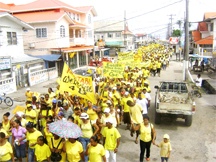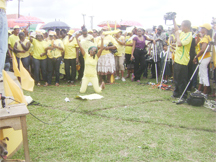By Gaulbert Sutherland and Mark McGowan
Thousands of Region Seven residents rallied in Bartica yesterday to protest government proposals they say will destroy the gold mining industry and with it their livelihoods.

In passionate tones, a sea of yellow-clad residents swept through the mining community, defending their right to mine. Significantly, leaders and villagers of several of the region’s Amerindian communities allied with miners; they participated in the protest march and conveyed messages of support. Local businesses organisations as well as other mining communities showed their support and the majority of businesses in the town were shuttered. The passenger boat service between Parika and Bartica was halted and though schools were open, only a few students turned up.
“This struggle here today is not a political struggle, this struggle is a bread and butter, this struggle is one of survival not so much for us who are old but for the future generations to come,” said Gordon Bradford, a member of the Committee of Concerned Barticians. He said that they are not going to back down but are also not approaching the issue with closed minds. “We are gonna discuss if they want to discuss and we are prepared also to compromise if they want to compromise,” he said.

Galvanised in opposition to proposed new regulations for the industry, particularly a six-month notification period before mining can commence, miners and supporters thronged the streets, clad in yellow–signifying gold, and similarly coloured flags and banners hanging from vehicles, homes, and businesses places. At the front, a sign read: “We are kindly asking the government of Guyana to allow mining to continue the same way as we are doing now. We need no new proposals or to change the present regulations on mining. God Bless.” Behind it, the crowd moved off followed by a caravan of vehicles. The protesters carried posters and chanted. “Norway,” chanted one woman. “No Way,” the crowd–over 2,000 in number and comprising men, women and children of every race–responded, referring to the recent forest protection agreement signed with the Norway. The protesters called for revision of the contentious proposals currently being considered; for “proper” consultation; and a meeting with President Bharrat Jagdeo. “We need gold,” they shouted. “Bartica is gold;” “No Mining, no living.”
At the rally following the march, spokesperson for the Committee of Concerned Barticians, Frederick McWilfred said they fear the enactment of new regulations in the gold mining industry would severely affect the gold mining industry, the community and their economic life. He said that they object to any cessation or interruption of medium and small scale mining and are prepared to protect their businesses and secure the economic development of the community. “We are maintaining that we cannot survive all the procedures and actions that have to be taken to have the forestry and mining sectors go through the dance they have to go through before we can dig out the gold,” he said.
He outlined several proposals for government’s consideration, including that there be no new regulations in the small and medium scale industry. Further, he urged government to seriously consider the proposal of the Guyana Gold and Diamond Miners Association (GGDMA) that seven to ten per cent of forest be set aside for alluvial mining, “which would be carried out in accordance with the existing regulations.” He emphasised that they are not against the Low Carbon Development Strategy (LCDS) or controlling deforestation or promoting clean mining, acknowledging that “we need to clean up our act because some of us indeed nasty up the place and misuse the mercury.” This point had earlier been raised by Bradford, who warned that they have to do mining in a safe and sustainable way because if they don’t then they are compromising the survival of future generations. “So we have our part to play and we intend to play our part but don’t bully us,” he asserted. “Mining is our survival. We don’t have anything else we can turn to,” he added.
Meanwhile, McWilfred recommended that the Land Use Committee–set up to look into these issues–be expanded to include representatives from communities such as Bartica and Mahdia, which depend almost entirely on gold for their economic existence. He pointed out too that recently, they were shocked to find out from the smallest-scale miners that they do not feel properly represented. He proposed that some mechanism be put in place to incorporate the concerns of the small-scale miners, noting that by and large they are not members of the GGDMA. “The process to find a resolution of the new regulations of gold mining…requires genuine consultation of all the stakeholders,” including small miners and communities not involved in the process now, he stated. If necessary the tenure of the committee must be extended, he said.
While proposals and recommendations were made and outlined, divine intervention was also sought. Representatives from the Christian, Hindu and Muslim religions prayed for wisdom to prevail and also forgiveness for what was done wrong in the mining sector. “Yes Lord,” “Alleluia” and other phrases rang out as women waved their hands in the air in prayer. “We chose to go into the mountains, into the depths of the rivers to seek our daily bread,” said Colin Hopkinson. He called on the Almighty to “touch the heart” of President Jagdeo and his Cabinet. The other religious leaders also prayed to God to guide the President and the Cabinet and not make them “hard-hearted like Pharaoh”.
The rally at the Bartica Community Centre Ground began with the sound of the Tradewinds’ “Not a blade of grass,” with the crowd singing aloud and women flinging grass in the air. The mining sector has closed ranks in opposition to the six-month notice period and several other recent measures, which have been linked to the government’s pursuit of the LCDS and the Norway agreement. It has been noted that ever since the LCDS came into being the authorities have been taking steps to tighten regulations in the relevant industries and the mining industry has seen increased focus, with miners being told that they would have to radically transform their mindset and operations.
Jagdeo has stated that the LCDS would not see a cessation of activities within the forest, and he assured that no rule would be made to shut down the industry. However, several miners have openly stated that with the proposals now being floated, the industry would be reduced to 10 to 15 small and medium scale miners. Industry operators note that in excess of 100,000 persons are directly and indirectly supported by the industry.
Yesterday representatives from several communities in the Region Seven and Region Eight (another area heavily dependent on mining) turned out in support. A miner from Mahdia noted that mining has an economic spill-off in all areas of the country. The President of the Bartica Chamber of Commerce pledged support “all the way” as did the Hire Car Association of Bartica and the Speedboat Association. “We demand the right to mine and pursue our livelihood,” said Sister Ellen from Dog Point.
“We face dangerous rapids and falls, malaria and disease, dangers all around. It is not an easy road,” said Vashti Layne of Bartica-Potaro road. Representatives of the Amerindian communities also pledged their support including Gregory Charles, the chairman of the Agatash Community Development Council; the Toshao of Karrou, the Chairman of Karatabo, representatives of Itaballi, Makoura, Agatash and Batavia, who said “what gives you a headache trouble us too.” In addition representatives of Riversview, Goshen, Falmouth, and a vendor from Parika also pledged their support. “Let us be firm in our determination to stand fast in our efforts to pursue to government of Guyana to consider the withdrawal of the new regulations intended for the alluvial gold mining in our community,” miner Shawn Hopkinson said. He urged that they make every effort to enlighten the government as to the adverse effects that the new regulations would have on their businesses and communities. He said their cause is clear; their requests are reasonable and their survival is at stake.
Mining entrepreneur, Chunilall Baboolall expressed deep concern at the effect the intended regulations would have on them. “We are convinced that they will severely restrict the mining activities in the medium and small scale categories.”
He said their information and present course of action are the result of data made available to them. A representative for Brazilian miners spoke passionately in support stating that she has been here for eight years.
“We will not waver, we will not flinch and we will pursue a resolution of the issues which we have enunciated here to its end,” McWilfred stated, stressing that they are prepared for the long haul and will not rest until a solution is found.





